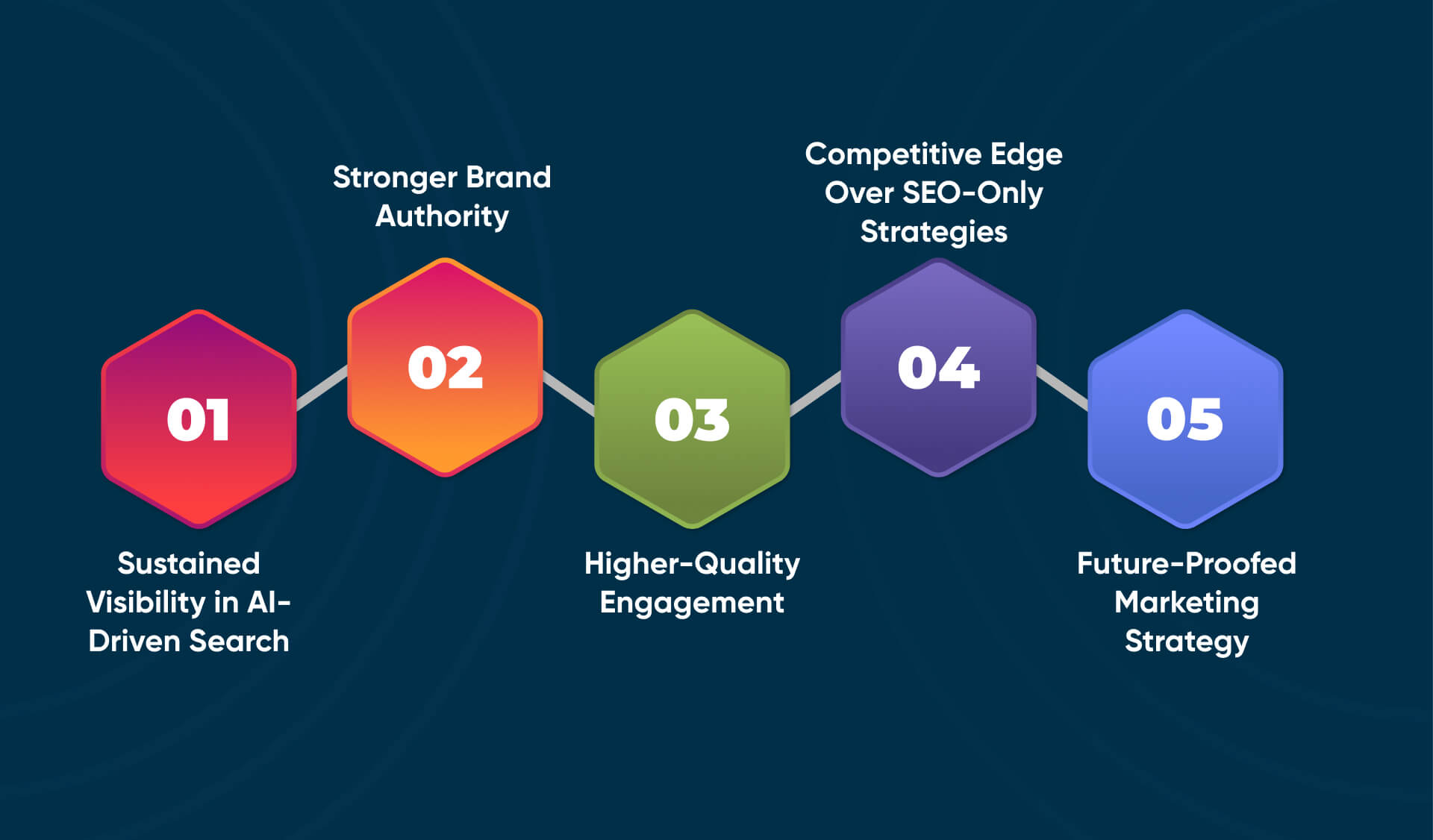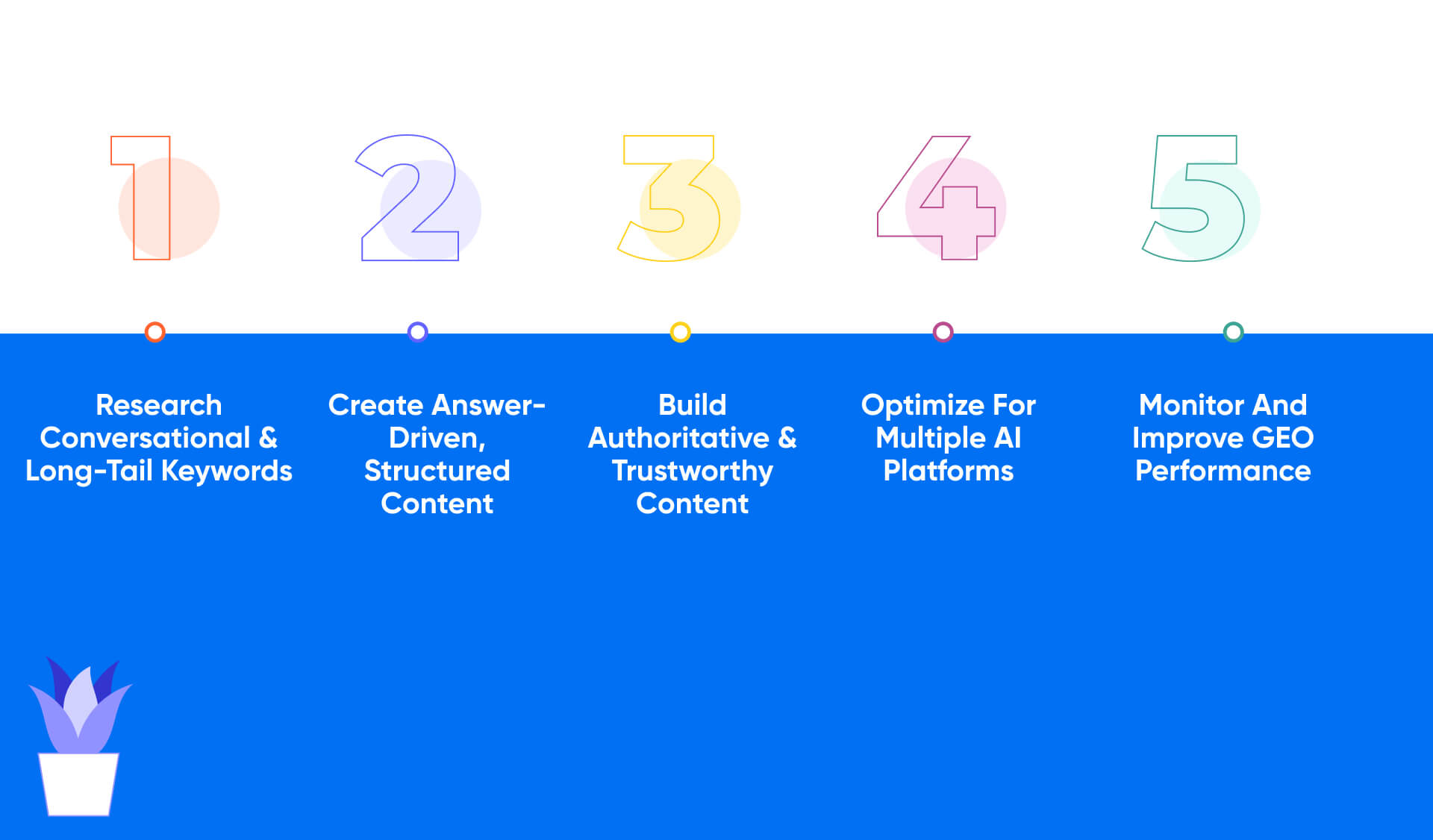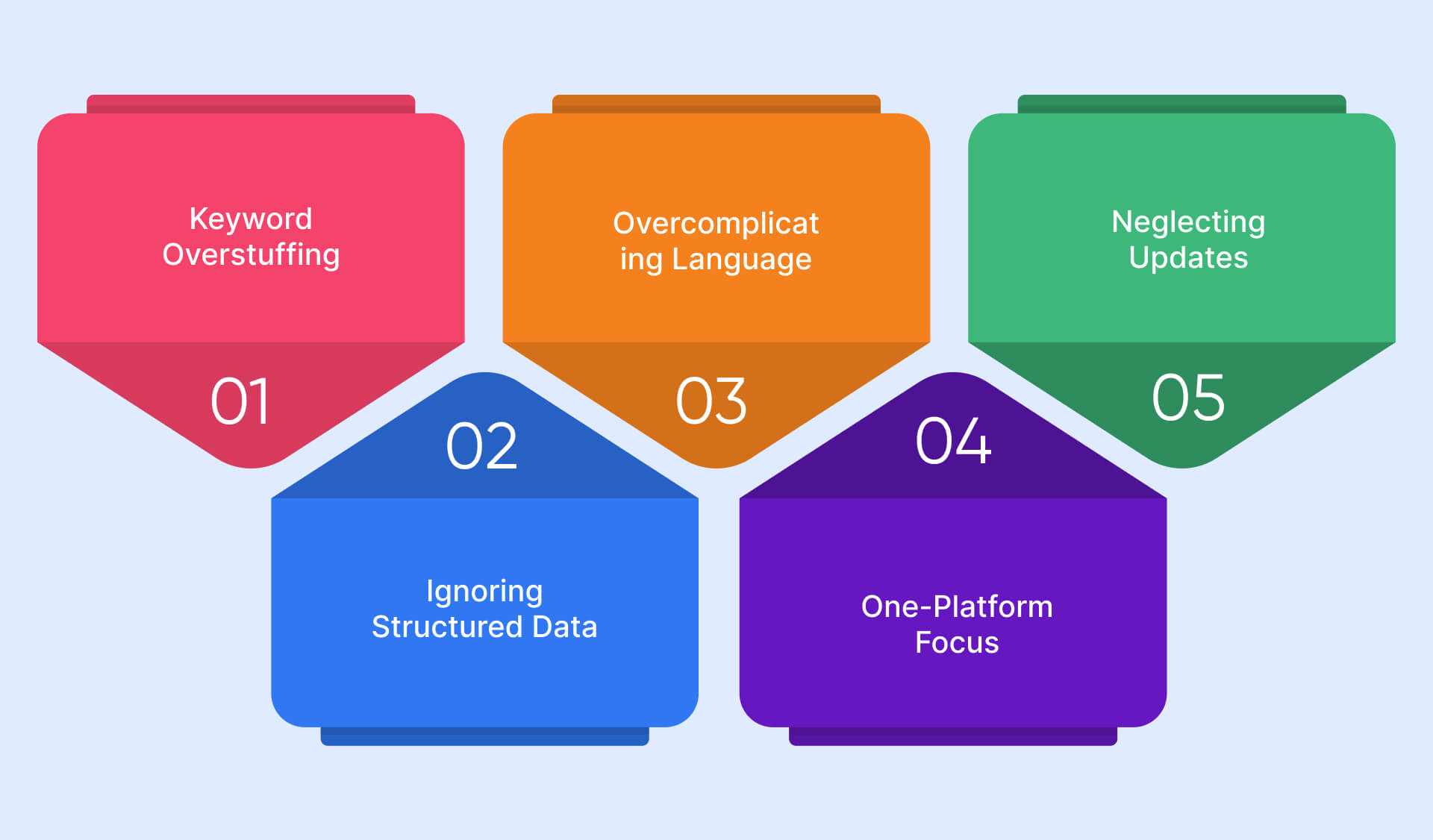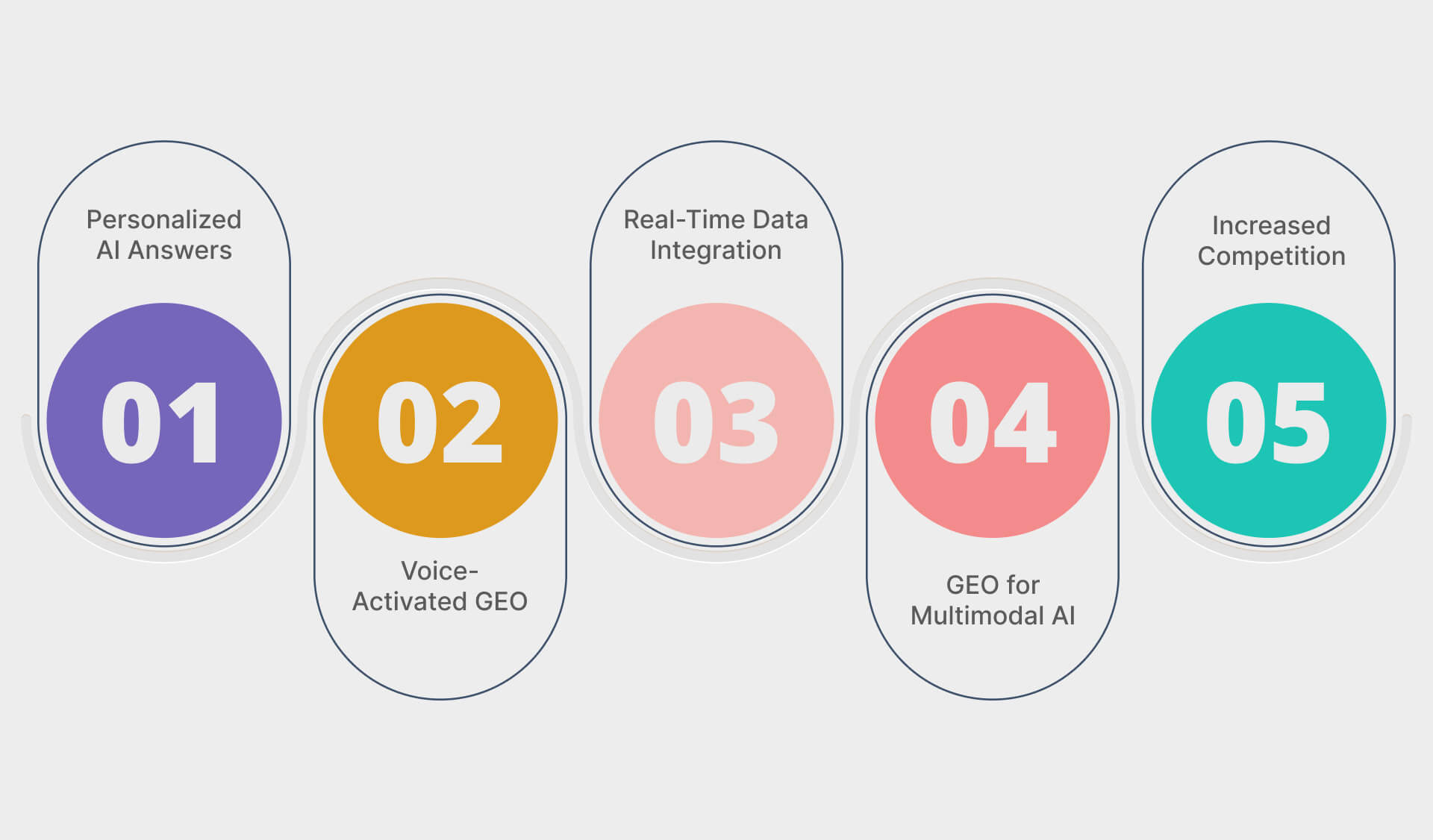How to Implement Generative Engine Optimization: A Complete Guide

 12 min
12 min
AI-powered sites like ChatGPT, Google's AI Overviews, and Perplexity are transforming the way people buy things online. This isn't something search engines can perform by themselves anymore. If you own a business that provides digital marketing services, learning how to implement generative engine optimization is a great way to get ahead of the competition and stay in business in a market where traditional SEO alone doesn't guarantee visibility. The main purpose of GEO is to make it easier for generative AI technologies to find, connect to, and respond to your content directly. This helps you maintain your brand voice intact, even when search results start to appear more and more like real conversations. It's not about following the rules; it's about figuring out how to make what people want work with how robots comprehend it. AI is transforming how people buy things faster than a click. The businesses who get on board early will be the ones who initiate the conversations that lead to sales. This book talks about the basics of GEO, why it's crucial for strategy, and how to apply it. It's for marketers who want to be leaders, not followers, in the age of AI-powered search engines.
What does Generative Engine Optimization (GEO) mean?
Generative Engine Optimization is the skill of putting together, organizing, and presenting content in a way that AI-powered chat and search engines can easily grasp, summarize, and show it in a way that is good for your business. The main goal of traditional SEO is to get your website to show up in search results. On the other hand, GEO makes sure that your thoughts are included in the AI's answers immediately soon. If you know how to implement generative engine optimization, this method can significantly improve your business.
Get your brand's answers ready for the most crucial job interview you'll ever have. The person who interviews you is a computer that has been taught how to find information from billions of sites. AI can ignore your content in favor of competitors' content that is easier for it to understand. GEO makes your expertise the best place to go for generating engines by using conversational keywords, answer-first content design, contextual linking, and authoritative sourcing. It's where words and technical strategies come together, and it's swiftly becoming the most popular aspect of the web.
Ready to future-proof your digital visibility?
AI-powered search is rewriting the rules. Fill the form to explore how GEO ensures your brand remains referenced, trusted, and competitive in AI-driven answers.
Get My GEO Plan
What You Need to Know About the Change from SEO to GEO
SEO was the most essential factor for a long time. Who got the click was based on backlinks, keywords, and meta tags. Generative AI doesn't just show you links; it provides you full answers with a lot of information. SEO has changed the way people use the internet. They don't want just a list of links to click on; they want immediate, in-depth solutions.
This adjustment is necessary since AI interfaces are now where significant choices are made. If your brand doesn't show up in these AI-generated answers, it's like it doesn't exist, even if it does well in regular search results. GEO is about data that is clear, reliable, and well-organized so that machines can read it without getting confused. Companies who know how to implement generative engine optimization have a big advantage since they make sure their content is useful to people and can be read by machines.
It's not replacing SEO; it's making it bigger. SEO wants to move up in the rankings, while GEO wants to be part of the discourse. For digital marketing service providers, dominating GEO means staying ahead of the competition, controlling the story about their business, and making sure clients can still be found in a world that is getting more and more AI-driven.
Benefits of Implementing GEO in Website

Generative Engine Optimization is not a new buzzword; it's a strategic shift that could change the way your website works with the next generation of search. The benefits go far beyond small increases in traffic; they completely change how visible you are in a world where AI-generated answers are increasingly the first and last stop for many consumers. To make sure these gains have a real-world economic effect, you need to know how to implement generative engine optimization correctly.
Sustained Visibility in AI-Driven Search
As more and more people use platforms like ChatGPT, Claude, and Google's AI Overviews for research, GEO makes sure that the information on your website is incorporated in the answers they offer. You might not be able to join the chat at all if you don't have it.
Stronger Brand Authority
When you organize your material so that generative engines can easily read and show it, you turn your brand become a reliable, repeating source of information in AI responses, which makes you an expert in your field.
Higher-Quality Engagement
GEO doesn't just get random clicks; it gets folks who are really interested and close to making a decision. That implies stronger leads and a better chance of turning them into customers.
Competitive Edge Over SEO-Only Strategies
Many businesses still just use old-school SEO methods. Early adoption of GEO lets you take the lead in a field where there aren't many competitors yet.
Future-Proofed Marketing Strategy
GEO is not replacing SEO it’s complementing it. By implementing both, your website remains discoverable in traditional searches while also thriving in AI-generated environments.
Step-by-Step Guide to Implement Generative Engine Optimization

Step 1 – Research Conversational & Long-Tail Keywords
Keyword research is still helpful, but GEO has to learn more about how people ask questions in conversational search. Instead of searching for "SEO tips," consider "how to implement generative engine optimization for small businesses" or "the best GEO strategies for marketing agencies." These queries are lengthier and more complex, just like how humans use AI chat interfaces.
There are a few programs that can help you find natural language queries, such as AnswerThePublic, AlsoAsked, and Google's People Also Ask. When you can, mix these with AI search logs to get a better idea of what people want besides just how many searches there are.
Step 2 – Create Answer-Driven, Structured Content
AI engines need to be able to readily get GEO content and provide it back as a straight answer. What this signifies is:
Leading with the answer and then going into further detail.
Using bullet points, numbered lists, and short paragraphs.
Including context, examples, and supporting data to reinforce authority.
Think of your page as a self-contained knowledge card. The more organized and clear your answers, the more likely AI will present them verbatim in generated outputs.
Step 3 – Build Authoritative & Trustworthy Content
Content that shows Experience, Expertise, Authoritativeness, and Trustworthiness (E-E-A-T) is what generative engines like best. This includes:
Using reliable sources and linking to trustworthy websites.
With expert bylines and qualifications.
Including new research, case stories, or insights based on data.
If you want to rank for "how to implement generative engine optimization," for instance, show off your agency's real-world outcomes by using before-and-after performance measurements to prove your expertise.
Step 4 – Optimize for Multiple AI Platforms
Different AI platforms read and get data in different ways. Google's AI Overviews include a lot of schema and structured data. ChatGPT uses well-formed, context-rich text, while Perplexity mixes sources with link citations.
Your GEO plan should have:
Schema markup for articles, how-tos, and frequently asked questions.
Headings and subheadings should always be the same.
Platform-specific content audits to make sure they fit with how people search for things.
Step 5 – Monitor and Improve GEO Performance
GEO is not a "set it and forget it" strategy, just like SEO. Use AI tracking tools and analytics to find out where your content shows up in the replies that are generated. Watch for:
Changes in how AI answers are structured.
Drop-offs in content inclusion rates.
Competitors overtaking your position in AI responses.
To stay on top, you should improve your writing, add new examples, and do keyword research every three months.
Want your brand cited in AI answers?
Don’t risk being invisible in generative search. Share your details, and we’ll design a GEO roadmap tailored to keep your expertise discoverable across all AI platforms.
Secure My Visibility
Essential Tools for GEO Success
The correct tech stack is a must-have for GEO to work well. The tools you use can have a direct effect on how well you learn how to implement generative engine optimization and keep long-term visibility across AI-driven platforms:
- Semrush & Ahrefs: For identifying long-tail and conversational keyword opportunities.
- AnswerThePublic/AlsoAsked: To map natural question patterns and user intent.
- Schema Markup Generators: Tools like Merkle’s Schema Markup Generator ensure your content is machine-readable.
- AI Performance Monitors: Platforms like Content at Scale AEO Tracker or NeuronWriter track inclusion in AI-generated answers.
- On-Page Optimizers: SurferSEO or Clearscope to align content with semantic expectations of AI systems.
Common Mistakes to Avoid in GEO

Even experienced marketers might make mistakes when they switch from SEO to GEO. Don't:
- Keyword Overstuffing: Adding too many phrases like "how to implement generative engine optimization" to content can make it hard to understand and hurt AI trust signals.
- Ignoring Structured Data: Without schema markup, your content may be invisible to AI engines scanning for quick answers.
- Overcomplicating Language: AI responds better to clear, concise explanations than dense, jargon-heavy paragraphs.
- One-Platform Focus: GEO should cover all major AI interfaces, not just Google or ChatGPT.
- Neglecting Updates: Static content risks becoming outdated and losing AI inclusion priority.
Want to turn AI into your growth engine?
GEO transforms visibility into measurable business impact. Submit the form, and we’ll show how to translate inclusion in AI answers into leads, authority, and conversions.
Start My GEO Growth
Future Trends in Generative Engine Optimization

The GEO landscape will evolve as AI platforms become more sophisticated. Here’s what’s on the horizon:
Personalized AI Answers
Generative engines will tailor responses based on a user’s past interactions, making hyper-relevant content even more valuable.
Voice-Activated GEO
Optimizing for voice-led AI queries will merge GEO with voice search strategies.
Real-Time Data Integration
AI systems will prioritize content that incorporates live data feeds and dynamic updates.
GEO for Multimodal AI
As AI begins processing text, images, and video simultaneously, GEO strategies will expand to include visual and audio optimization.
Increased Competition
As GEO becomes mainstream, early adopters will need to double down on content quality and differentiation to maintain dominance. Businesses that already understand how to implement generative engine optimization will be better positioned to adapt quickly and maintain their advantage.
The businesses that adapt now won’t just keep up; they’ll set the standard for visibility in the AI-first search era.
Why Choose Edifying Voyages for Your GEO Strategy
In the fast-moving world of AI-driven search, working with an agency that only “knows SEO” is no longer enough. Edifying Voyages, a team of organic SEO experts and digital strategists, brings years of marketing experience, proven search frameworks, and early adoption of generative engine optimization to position your brand where the next wave of visibility is happening inside AI-generated answers.
We don’t just optimize; we future-proof. Our approach blends deep keyword intelligence, conversational content architecture, and cross-platform AI optimization to ensure your expertise is not just found but referenced. We anchor every campaign in measurable performance, monitoring your brand’s inclusion in AI responses and refining strategies as generative algorithms evolve.
Our clients choose us because we combine technical precision with narrative craftsmanship, producing content that is both machine-structured and human-persuasive. Whether you’re an agency looking to offer GEO as a premium service or a brand seeking a competitive advantage, our process delivers authority, trust, and long-term discoverability.
To keep campaigns ahead, we release in-depth GEO strategy updates twice a month, aligning your visibility with the latest AI platform shifts and competitive intelligence.
Ready to dominate AI-first search landscapes?
Early adopters of GEO will own the next decade of visibility. Submit the form to position your brand as a default answer in generative platforms.
Dominate With GEO
Conclusion
Generative Engine Optimization is not just a fad; it’s the new space where people search for answers. SEO is still important, but relying only on it is like showing up to a modern race in an old car: you’ll move forward, but you won’t win. GEO ensures that your voice, ideas, and expertise are embedded directly into the conversations users are having on AI-powered platforms.
For digital marketing service providers, knowing how to implement generative engine optimization can be the difference between leading the market or constantly playing catch-up. Businesses that adopt GEO today will secure a bigger share of AI-driven visibility tomorrow.
At Edifying Voyages, a trusted offshore SEO company, we bring together technical accuracy and creative authority. This ensures your brand is not only easy to discover but also consistently positioned as the trusted answer. The future of search is already here. The question is: are you shaping it, or is it shaping you?
FAQs
While SEO focuses on ranking in search engine results pages, GEO ensures your content is formatted and structured for AI systems to reference directly in generated answers. It’s about earning inclusion in conversations, not just positions on a list.
No. GEO targets multiple AI platforms Google AI Overviews, ChatGPT, Claude, Perplexity, and others each with unique retrieval patterns. A true GEO strategy adapts content for all major AI ecosystems, not just one.
Basic SEO skills help, but GEO also requires understanding schema markup, AI query intent, and structured content formatting. Many businesses partner with agencies like Edifying Voyages to handle the technical and strategic execution.
Absolutely. In fact, smaller publishers can gain significant traction by being early adopters. AI engines often value clarity and specificity over sheer domain size, meaning well-optimized smaller blogs can compete with bigger brands.
Tools like AnswerThePublic and AlsoAsked help uncover conversational queries, with Ahrefs and Semrush monitor keyword performance. For tracking AI answer inclusion, platforms like Content at Scale AEO Tracker and NeuronWriter are emerging as industry favorites.





